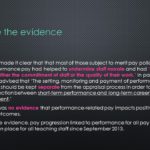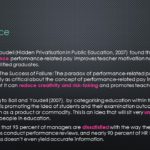The conversations around #TLT16 have been thriving today. David Fawcett and Jenn Ludgate are fantastic organisers, Southampton University grand hosts and the many presenters that prepare the sessions deserve an honorable mention (I know I enjoyed mine).
This year, I used #TLT16 as personal commitment to write up my research and investigations into performance management and performance related pay (PRP). David’s email back in June gave me plenty of time to prepare.
Motivations
My heckles were up in light of the “lesson observation rating” debacle that had haunted teaching a few years back (and plagues some Performance Review policies still). My thought process – if lesson observations are flawed, then the appraisal processes that employ lesson observation grades / scores are flawed, though I feared it went deeper than that. Performance reviews themselves felt – flawed and lacking sufficient compassion to be developmental? In refocusing lesson observations for professional development as opposed to professional appraisal (led by Paul Blake) we turned to the Teachers Standards as a professional marker, though objectives, and in particular, outcome based objectives stubbornly remained.
With minimal investigation it was evident that there was something fundamentally wrong with Performance Reviews, then separately and additionally, PRP. The swathe of highly successful businesses fleeing their associations with performance reviews (rank and yank and 360s), were more than a clue to keep digging. Investigations into the consequences of PRP were equally disconcerting and soon the amount of reading and research gathered was worthy of its own folder in my dropbox. So to confirm both appraisal and PRP seemed to lack an empirical support.
But who am I to challenge the Department of Education’s policy and various Inspection frameworks? Importantly, before I go any further, I have to admit that I do not yet have an appropriate solution to counter my criticisms and I feel that is a little irresponsible. Recognition programmes, collect bonus…
Policy
Performance-related pay progression enables schools to recognise and reward a teacher’s performance through an increase in pay. It can act as an incentive for continuous improvement.
Appraisal should be a supportive, developmental process designed to ensure that all teachers have the skills and support they need to carry out their role effectively. It should help to ensure that teachers continue to improve their professional practice throughout their careers.
Supportive and developmental – I found minimal evidence to support that claim. Moreover the over-riding, vast majority of managers are dissatisfied with the way their companies conduct performance reviews. The cartoon back catalogue not backwards in coming forward with popular criticism.
Second, many forward thinking and successful companies are reporting that appraisal is facing the “wrong way.” Looking back at performance is akin to a helpful autopsy, when it should be looking forward and guiding performance. This is not new thinking.
The very nature of most appraisals or evaluations, however, may inhibit performance unintentionally by focusing energy, attention, and effort on past shortcomings rather than future successes. Christopher D. Lee, Ph.D., SPHR CUPA-HR Journal, v54 n1 p5-8 Spr 2003.
As for the factors schools may take into account when making judgements, the most common, “measuring pupil progress,” is fraught with inconsistencies and complexities (as reported by many, more qualified than I). Wider outcomes, specific areas of practice, impact on effectiveness of teachers or other staff and a wider contribution to the work of the school, may ironically be more easily evidenced – if vulnerable to idiosyncratic rater effects.
As for those stubborn progress outcome based objectives – there is / was no evidence that performance-related pay impacts positively on student outcomes.
I am therefore, understandably, concerned when inspection reports comment upon “staff performance and pay progression.”
They also ensure that only the very best teaching is rewarded with pay increases. – Kennet School (136647)
Rigorous systems are in place to manage the performance of staff and to ensure teachers’ pay is closely linked to students’ achievement. Silverstone UTC (139690)
Lastly, and it may only be a small and trivial point, can we decide on the nonmenclature. Performance management or appraisal?
Following far too much time expended reading and exploring both educational and business literature, I presented my findings today at #TLT16.
Atkinson, Adele; Burgess, Simon; Croxson, Bronwyn; Gregg, Paul; Propper, Carol; Slater, Helen, and Wilson, Deborah. (2004) Evaluating the Impact of Performance-related Pay for Teachers in England. Working Paper 04/113, Centre for Market and Public Organisation, University of Bristol.
Bichard, M. (Chair) (1999) Performance Management: Civil Service reform – a report to the Meeting of Permanent Heads of Departments, Sunningdale 30 September-1 October 1999. Cabinet Office, London. Ref: CABI-5195/9912/D4
Department for Education and Employment (DfEE) (1999) Teachers: meeting the challenge of change. Technical consultation document on pay and performance management. Department for Education and Employment, London
Dowling B, and Richardson R. (1997) Evaluating performance-related pay for managers in the National Health Service. International Journal of Human Resource Management, 8:3, June, pp. 348-366.
Makinson, J. (Chair) (2000) Incentives for change: rewarding performance in national government networks. Public Services Productivity Panel, HM Treasury, London
Marsden, David W, and Richardson, Ray. (1994) Performing for pay? The effects of ‘merit pay’ on motivation in a public service. British Journal of Industrial Relations, 32:2, pp. 243-262, June.
Marsden, David, and French, Stephen (1998) What a performance: performance related pay in the public services. Centre for Economic Performance Special Report, London School of Economics.
Marsden, David and Belfield, Richard. (2007) Pay for performance where output is hard to measure: the case of performance pay for school teachers. Advances in Industrial and Labor Relations, vol 15, pp 1-37.
OECD (2005) Landel, Dorothée, and Marsden, David. (2005) Performance related pay policies for government employees: an overview of OECD countries. Organisation for Economic Cooperation and Development, OECD, Paris.
Wragg, E.C., Haynes, G.S., Wragg, C.M. and Chamberlin, R.P. (2001) Performance related pay: the views and experiences of 1,000 primary and secondary head teachers, Teachers’ Incentive Pay Project, Occasional Paper No. 1, University of Exeter.
A review of the evidence on the impact, effectiveness and value for money of performance-related pay in the public sector – The Work Foundation
Reversing the ‘Widget Effect’ The introduction of performance-related pay for all teachers in English schools. The Policy Exchange.
Reversing the ‘Widget Effect’ The introduction of performance-related pay for all teachers in English schools.
Why effective use of evidence in the classroom needs system-wide change. Nfer.
A blind pursuit. Ron Donaldson questions the use of targets in a world that has been taught that if it cannot be measured, it cannot be managed.
Using Value-Added Models for Educational Assessment – April 8, 2014. American Statistical Association.
Numerous online post and interviews. Phone conversations and email exchanges.


















